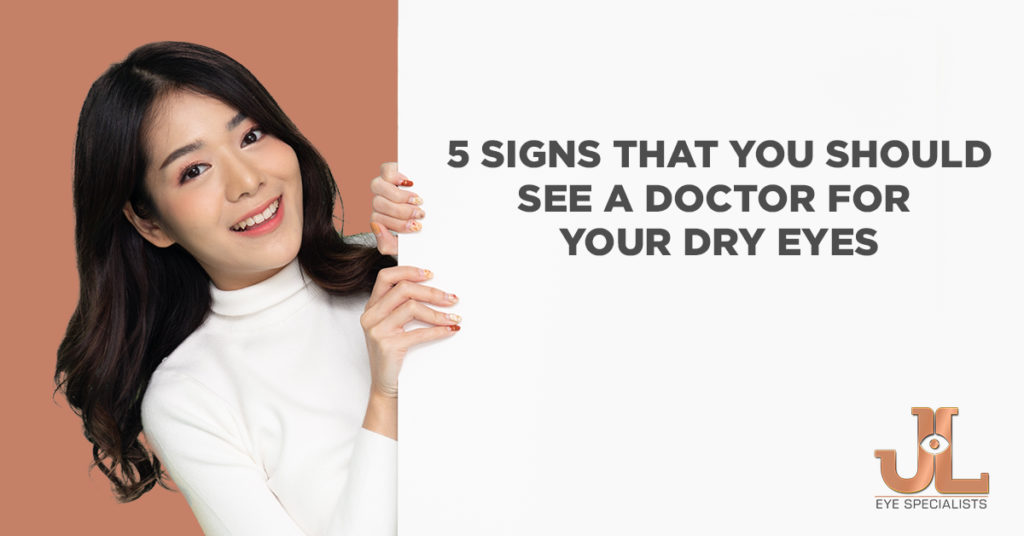5 Signs That You Should See A Doctor For Your Dry Eyes
Even if you’re not crying, your eyes are filled with tears to protect the surface from infection and injury. Without adequate tears, you are prone to certain eye conditions, so there’s no reason you would want your eyes to be dry.
If it’s left untreated, dry eyes can lead to more serious health issues, including corneal surface abrasion, eye inflammation, corneal ulcers, and even vision loss.
A dry eye is common and in most cases is not cause for concern. But when should you see a doctor for dry eyes? We’ve rounded up the warning signs you should watch out for if you have dry eyes, and when to schedule a consultation with your dry eye doctor.
But first, let’s tackle the difference between normal eyes and dry eyes.
What is the Difference Between Normal and Dry Eyes?
The tear system normally maintains the moisture of the eyes. The tear film on the eye’s surface is crucial in maintaining vision. Tears work by lubricating and nourishing the eye’s surface as well as washing away foreign bodies and debris.
The thin, smooth, and balanced tear film contains mucus, oil, and water to make sure that the vision is clear. Any abnormality in the tear level on the surface can impair clear vision and cause discomfort, including tearing, irritation, burning, and blurred vision.
There are two ways tears can cause eye problems or discomfort – when there are too many tears and when there are inadequate tears.
In a blocked tear duct, wherein the duct becomes narrow or blocked, the tears go back into the eyes instead of going into the nose. This causes watery eyes.
On the other hand, dry eye syndrome, also called keratoconjunctivitis sicca (KCS), is a condition wherein the eye is not being kept wet enough to be comfortable. Dry eyes can be caused by a multitude of factors, including ageing, some medications, health conditions like eyelid inflammation, thyroid problems, diabetes, environmental conditions, and the long term use of contact lenses.
What are the Symptoms of Dry Eyes?
Dry eyes can cause a multitude of symptoms, including redness, light sensitivity, watery eyes, stinging, burning, scratching, blurred vision, and stringy mucus near the eye.
In some cases, however, excess tears will come out from the dry eyes. This occurs when the eyes don’t get enough tears for lubrication.
The eyes tell the brain that it needs more lubrication, hence, the eye becomes flooded with “emergency tears.” However, these tears are mostly water and don’t contain the lubricating qualities needed to make the eyes feel comfortable.
Learn More About: Dry Eyes – Causes, Symptoms & Treatment
When Should I See a Dry Eye Doctor?
Dry eye is a common condition everyone will experience at least once in their lifetime. The prevalence of dry eye increases with age, and it’s a common disorder affecting people in their middle age.
Though you may think that dry eyes will just go away, you should also watch out for some signs and symptoms that may indicate a more serious problem.
Make sure to visit a dry eye specialist when your symptoms aren’t going away, management at home doesn’t help, and you’re not sure what’s causing your dry eye.
Here are the 5 signs to watch out for — these should tell you that the dry eye you are experiencing is not normal and should be consulted with a specialist:
- When you are getting no relief from eye drops
- When you have burning, scratchy, stinging, or watery eyes despite treatment
- When you are having problems performing normal activities
- When you notice changes in vision due to dry eyes
- When your dry eyes are disrupting your daily activities
Since the dry eye can lead to complications that may impair your vision and affect your quality of life, consider seeing an ophthalmologist or eye doctor soonest. Prolonged symptoms may indicate a more severe type of dryness and need medical attention.
What is a Dry Eye Specialist?
Dry eye doctors or dry eye specialists are medical professionals that help treat patients with dry eyes. They also help identify the underlying causes of the condition.
The common conditions dry eye doctors treat include:
- Blepharitis – a condition wherein the edge of the eyelids where the oil-producing glands are located is inflamed.
- Lid Margin Disease or Meibomian gland dysfunction – The condition is characterised by the cessation of production of the needed amount of oil for tears by the small glands in the eyelids.
- Stye or Chalazion – A stye is a small pimple-like bump that comes out on the lower eyelid. This is caused by a blocked oil gland. On the other hand, a chalazion is a blocked oil gland.
The doctor also evaluates autoimmune disorders that may cause dry eyes, including Sjögren’s syndrome, rheumatoid arthritis, sarcoidosis, or lupus.
Learn More About: Dr Jimmy Lim, Ophthalmologist – LASIK, Cataract & Corneal Surgeon
What to Expect During a Consultation with a Dry Eye Doctor?
The doctor can examine your eyes and land a diagnosis. First, the doctor will interview you about your medical history to determine any autoimmune disease or medications that can cause dryness in the eyes.
Further, tests and other procedures will be needed to determine the root cause of your dry eyes. These tests include a comprehensive eye examination; tear tests to see if its volume is normal or if the quality of the tear is enough to lubricate the eyes; tear film evaporation and tear breakup test.
How to Find a Dry Eye Specialist?
If you’ve been struggling with dry eyes, don’t wait until the symptoms become worse before you look for a dry eye specialist.
Usually, you’ll receive a referral to see a dry eye specialist. The doctor will manage the condition to ensure that you won’t feel any discomfort. The treatments may include prescription eye drops, special contact lenses, and tear duct plugs.
To find out whether you or a loved one might benefit from our dry eye assessment, diagnosis, and treatment, our medical director Dr Jimmy Lim at JL Eye Specialists can evaluate your dry eye condition and determine appropriate treatment options. Book a consultation with Dr Jimmy Lim today.
Related Post:
More Topics to Explore:
Relevant Services:
Our Doctor

DR. JIMMY LIM
Dr. Jimmy Lim is a top ophthalmologist for cataract eye surgery in Singapore, offering over 20 years of expertise in cataract treatment and management.
Gleneagles Medical Centre
6 Napier Road #07-10,
Singapore 258499
Phone: +65 6258 8966
Fax: +65 6258 8766

JL Eye Specialists is an ophthalmology clinic in Singapore that specialises in general ophthalmology, cornea, refractive (LASIK), and cataract surgery.
To cover the expenses that you may incur, we accept several corporate and international insurance policies. If you have any of the insurance plans at this side, please let us know when you schedule an appointment with us. For more questions, feel free to contact us at +65 6258 8966.





